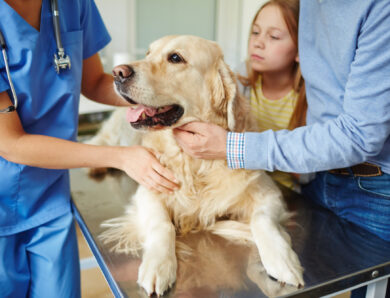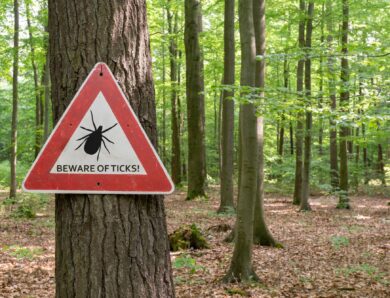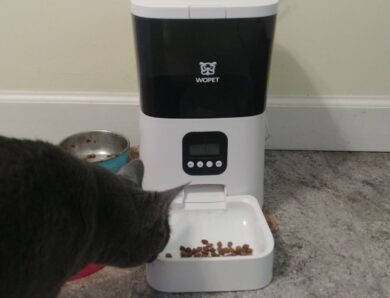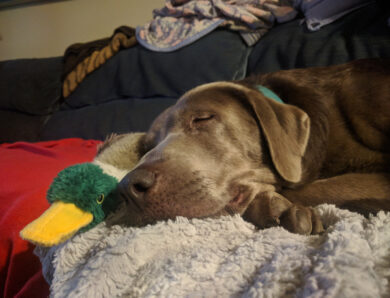
Chew Toy Safety For Dogs
A good rule to follow is this: if you can drive a nail into a piece of wood with the toy, it’s too hard.
Chew toys are an essential part of a dog’s life. They help keep teeth clean and offer minutes — or hours, depending on what’s being chewed — of doggy bliss. But not all chew toys are safe. Here are a few hard and fast rules all dog parents should know when it comes to chew toy safety.
First and foremost, if it’s too hard it can, and likely will, break your dog’s teeth. Broken teeth can lead to open wounds, infections, and can cause your pup a lot of pain. Plus, the vet bill to fix her broken teeth can be shockingly high.
If you can’t leave an indentation in the toy using your thumbnail, it’s too hard. It doesn’t matter how powerful a chewer your dog is. The chances are too high that your dog will eventually break a tooth; its just not worth the risk.
Even if your dog avoids breaking a tooth, she could still be in danger. Powerful chewers that are able to break apart the hardest chew toys risk ingesting pieces of sharp rubber or nylon that can perforate their intestines or stomach lining. Often surgery can’t even fix those injuries.
A good rule to follow is this: if you can drive a nail into a piece of wood with the toy, it’s too hard.
On the exact opposite side of the coin, you don’t want a toy that’s too soft. Toys that are too soft are easily ripped apart by your dog, leading to your fur baby swallowing entire chunks or the stuffing inside. Anything indigestible that winds up in your dog’s stomach can cause irritation or blockages. Most blockages need surgical intervention, without which your pup could die.
Match the Chew Toy to the Dog
The first step in safely choosing a chew toy for your dog is picking the right shape and size for your dog. A large dog should not be chewing on a small toy; the risk of swallowing or choking on it is too great. If your dog is over 50 pounds, give her a large dog chew toy.
A small dog, on the other hand, shouldn’t be chewing on something made for a super chewer. You don’t want your Chihuahua straining his jaw with something designed for a rottweiler. Depending on how much your dog weighs, you might even want to look for something designed for pups under five pounds.
Supervision is Essential
Never let your dog chew on a toy unsupervised. That means no leaving the dog overnight with a KONG or going into the kitchen to check the food while she’s still gnawing away on a rawhide. Dogs, like babies, do not know how to protect themselves. They’ll stupidly swallow something too sharp or too large without a thought.
You need to be on hand to take away the nub of rawhide that’s left or to switch out a broken Nylabone for a bully stick before any damage is done.
It might seem like a nuisance to have to supervise your dog’s chewing time, but the alternative means risking your fur baby’s wellbeing and your wallet.
These Dog Chew Toys are a No-No
Bones/Cow Hooves
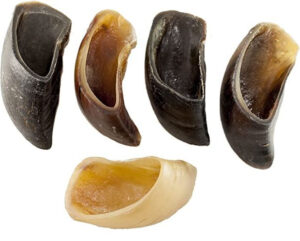
Bones and cow hooves pose a double risk to dogs. On the one hand, they’re prone to splintering, which can lead to punctures in your dog’s mouth, digestive system, or stomach. On the other hand, they can be hard enough to break teeth.
The risk is great enough that the U.S Food and Drug Administration has a warning on its consumer website that extends not only to table scrap bones you might toss to the dog, but also to the bones you can buy at the pet store.
According to the FDA, bone-related issues reported by vets have included blockages in the digestive tract, choking, cuts and wounds in the mouth or on the tonsils, vomiting, diarrhea, rectal bleeding, and death. (The FDA cites 15 deaths reported over a period of seven years.)
Cow hooves can also splinter and break causing the same problems. Additionally, some hooves, particularly those from China, are washed using dangerous chemicals like lye, which is harmful to your dog.
Save 10% when you buy 2 Breed + Health kits! Use Code: MULTIPACK2 at checkout.Deer Antlers
Antlers are harder than bones and cow hooves, so are less likely to splinter. But something that hard isn’t great for your dog’s teeth. Plus, if the tip of an antler breaks off and your dog swallows it, it’s sharp enough to do some serious internal damage.
Moose antlers are a better option than deer or elk antlers as they tend to be softer. You can also buy them in different shapes and sizes so you can pick something appropriate for your dog.
Pig’s Ears
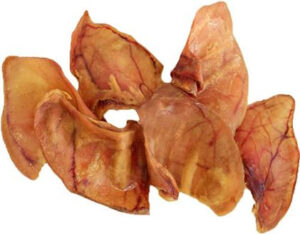
Pig’s ears are a favorite chew item for many dogs. They’re soft enough to not break teeth and they can last a long time. But pig’s ears can cause other issues for your pup. For one, if a piece of the ear breaks off, it can get lodged in your dog’s throat, intestinal tract, or stomach.
But most significantly, pig’s ears can play host to all kinds of bacteria including salmonella.
In July 2019, the FDA tied a salmonella outbreak that affected 154 people to pig ears sold as dog treats. Ultimately, five separate recalls of pig-ear chews were issued. The outbreak passed by October of 2019, but the FDA continues to urge caution when it comes to giving dogs pig ears.
Choose These Dog Chew Toys with Care
Nylon Chew Toys
Nylon chew toys including Nylabones can be a good option for your dog but only under strict supervision and when giving the right product to the right dog. Most importantly, you never want to give rigid nylon toys as they’re too hard for most dogs and can result in broken teeth.
Look for options that have a little give and then keep an eye on your dog while he’s chewing. Anything that’s soft enough to chew can be broken apart by a strong enough chewer. And that puts them at risk for swallowing pieces that can cause an obstruction.
If you see your dog break his chew toy apart, take it away immediately. You never want to let your dog chew on an already broken chew toy.
Rawhide Chews
Rawhide can be a good choice for most dogs, with certain caveats. Most dogs will spend hours chewing on a rawhide without breaking it into pieces. The only exception would be super chewers, who would be better off with something a bit tougher.
One thing vets recommend watching out for when buying rawhide is where they come from. Whenever possible buy rawhide sourced from cows originating in the United States. Many rawhides comes from China where processing practices are often unregulated.
Always give your dog an appropriately-sized rawhide for her size, and keep an eye on the rawhide so that you can take it away once it gets too small.
Rope Toys
Rope toys as chewing options are okay for most dogs, except power chewers. If your pup likes to nibble on toys or is a moderate chewer, you can leave a rope toy with her to enjoy for some time. Just be sure to keep an eye on her to make sure she doesn’t pull out any of the strings. Loose strings that are ingested can wrap around a dog’s intestines, causing all kinds of problems.
Best Dog Chew Toys
KONG Toys
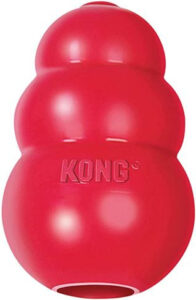
Vets generally agree that KONGs are safe chew toys for dogs; you just need to make sure you choose the right size and style for your dog.
Made from softer rubber, the Puppy and Senior options are safer for dogs with vulnerable teeth. The Classic version should be good for most adult dogs, excluding super chewers who would do better with Extreme.
Edible Nylabones
Though they won’t last anywhere near as long as inedible Nylabones, the company’s edible options are a safer alternative. For one, you don’t have to worry about your dog’s teeth breaking. So long as your pup is older than about 3 months, he’ll be fine.
Additionally, there’s less of a choking or digestive obstruction issue, as these chew treats are digestible (and generally smaller than the non-edible toys).
Bully Sticks
Another edible option is bully sticks. Though not as long-lasting as rawhide, bully sticks are safer. Made strictly from beef muscle, they’re easily digestible for most dogs. They’re also soft enough that broken teeth are not an issue. Plus, they won’t splinter so no worries about internal damage.
Bully sticks come in multiple shapes and sizes to accommodate most chewing preferences. Braided sticks are best for super chewers, while straight sticks are good for moderate chewers and nibblers.
Veterinary Oral Health Council Accepted
The VOHC has approved two rawhide chews: Cheweez Beefhide Treats and Purina Veterinary Diets Dental Chewz. Both are approved for their ability to wear down tartar and plaque; both are also considered safe for your dog.
Want to be a better pet parent? Check out 6 TED Talks That Will Make You a Better Pet Owner.
